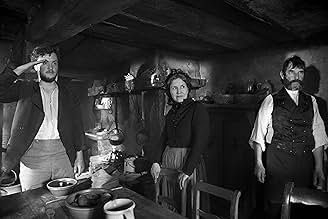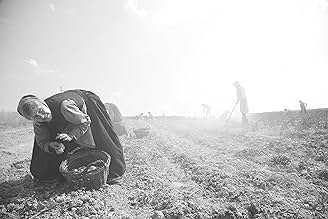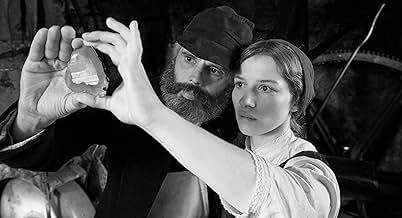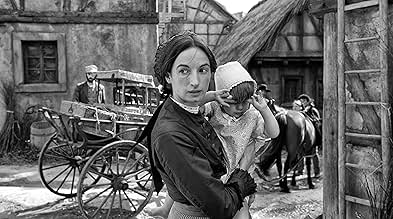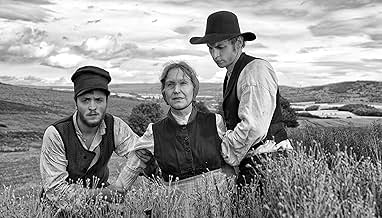Heimat: Chronique d'un rêve
Original title: Die andere Heimat: Chronik einer Sehnsucht
IMDb RATING
7.9/10
1.6K
YOUR RATING
Jakob longs for a new life for himself and his troubled family in Brazil.Jakob longs for a new life for himself and his troubled family in Brazil.Jakob longs for a new life for himself and his troubled family in Brazil.
- Director
- Writers
- Stars
- Awards
- 9 wins & 8 nominations total
- Director
- Writers
- All cast & crew
- Production, box office & more at IMDbPro
Featured reviews
Not only a song title, but also a dilemma many people in villages might face. There's always reasons that will feed into both sides of the argument (or the decision on what to do). This movie has been considered and called "boring" by some. And I wouldn't blame anyone saying that, because the pace of the movie is really slow.
It takes the time to introduce the characters and it also takes the time to make the evolve (or devolve). The journey might not lead always where you expect it to go and "rules" (unwritten ones) defy feelings many times. But some things can obviously not be changed. So the characters do have to go with the flow of things. Melodrama that could be easily avoided ensues, but that's life isn't it?
It takes the time to introduce the characters and it also takes the time to make the evolve (or devolve). The journey might not lead always where you expect it to go and "rules" (unwritten ones) defy feelings many times. But some things can obviously not be changed. So the characters do have to go with the flow of things. Melodrama that could be easily avoided ensues, but that's life isn't it?
I won't write a long panegyric here: I can just say that if you liked the other "Heimat" installments, you will like this "prequel" as well. And if, like many viewers, you watched the previous films with an almost religious devotion, you will feel the same way about this one (actually, two).
Somehow Reitz has found the secret of putting his viewers deeply into the situation to the point where you really do feel "you are there" -- and he can do this whether the setting is contemporary, early 20th century or, as here, in the 1840's.
The first installment is admittedly a little long, but there is ample payback in the second, which seeing the first is necessary in order to set up the situation.
Somehow Reitz has found the secret of putting his viewers deeply into the situation to the point where you really do feel "you are there" -- and he can do this whether the setting is contemporary, early 20th century or, as here, in the 1840's.
The first installment is admittedly a little long, but there is ample payback in the second, which seeing the first is necessary in order to set up the situation.
10harvbenn
How many unforgettable images can Edgar Reitz create? Country girls given coins, stare dumbly into their palms. A girl with a malformed leg is ostracized. Country people protest "Liberté!" to returned Prussian authorities. A stone cutter becomes mute on his way to oblivion, but first he cuts an agate slice that contains the world. Where do Reitz, and Casting Director An Dorthe Braker (Downfall, Bader-Meinhof Complex), find actors who seem to step out of a time machine? Where does Reitz get the poignancy of turns of fate changing lives utterly in a world where everything is grown, pounded, turned, and wrested from the earth, if not by yourself and your family, by others who you've known all your life? Under the comet of 1843, hawkers sell passage to paradise to people who never once left the Hunsruck. The damson berries are harvested, and youths become intoxicated on music and dancing. A Prussian lackey reads a hateful decree to an empty street. A lone rider brings more emigration papers. Neighbors and families walk beside their wagons, to Rotterdam and beyond on a journey they cannot comprehend except that there is no return. In Schabbach, the remaining Simons endure, and repair and improve the family smithy. A letter arrives from Brazil after 13 months, and is read to the astonished gathering. We are in Schabbach to witness all of this.
Sometimes a movie has to take four hours. If you stay that long, you not only learn to know the characters, they get under your skin.
A Prussian village. Not boiling yet, because 1848 revolts are some years away, but there are signs. So far people just emigrate, to Brazil in this case, leaving centuries of traditions behind. A sign of something arriving. The minds aren't satisfied.
But the main story is about the village, as a small society and universe there the borders are too close. But the film is anyway focused on individuals. Trying to get shelter from the storm. Which goes on in their souls
A Prussian village. Not boiling yet, because 1848 revolts are some years away, but there are signs. So far people just emigrate, to Brazil in this case, leaving centuries of traditions behind. A sign of something arriving. The minds aren't satisfied.
But the main story is about the village, as a small society and universe there the borders are too close. But the film is anyway focused on individuals. Trying to get shelter from the storm. Which goes on in their souls
Home from Home; Chronicle of a vision is also called 'Die Andere Heimat'. It is the story of Jakob in a fictional village it chronicles a time when emigration was the curse of all Europe. There was a better life awaiting in the New World – and in the case of Jakob this was Brazil.
It also tells the story of inter familial strife, the rifts that religion can cause and the triumph of love and intelligence over everything. It is filmed in black and white and is done so beautifully. Black and white needs much more lighting to get it to look right and this has been done here pains takingly. There is colour too but only at crucial moments to highlight the beauty of a flower or a meadow and to add simple emphasis to a scene – as done in the silent films 'Gold' and 'The Phantom of the Opera'.
We span many years and this lasts a whopping 235 minutes – I watched in two sittings but it is well worth it. It has a lost world charm about it and yet still so many things to impart. Simple, stunning, evocative and very moving in places too. This is a film for real cinephiles and especially those who love European cinema.
It also tells the story of inter familial strife, the rifts that religion can cause and the triumph of love and intelligence over everything. It is filmed in black and white and is done so beautifully. Black and white needs much more lighting to get it to look right and this has been done here pains takingly. There is colour too but only at crucial moments to highlight the beauty of a flower or a meadow and to add simple emphasis to a scene – as done in the silent films 'Gold' and 'The Phantom of the Opera'.
We span many years and this lasts a whopping 235 minutes – I watched in two sittings but it is well worth it. It has a lost world charm about it and yet still so many things to impart. Simple, stunning, evocative and very moving in places too. This is a film for real cinephiles and especially those who love European cinema.
Did you know
- TriviaThe strange brass instrument played by Florine at the Smearcase Fair is an ophicleide.
- ConnectionsFollows Heimat: Eine Chronik in elf Teilen (1984)
- How long is Home from Home: Chronicle of a Vision?Powered by Alexa
Details
- Release date
- Countries of origin
- Official sites
- Language
- Also known as
- Home from Home: Chronicle of a Vision
- Filming locations
- Production companies
- See more company credits at IMDbPro
Box office
- Budget
- €8,000,000 (estimated)
- Gross worldwide
- $1,601,058
- Runtime
- 3h 51m(231 min)
- Color
- Aspect ratio
- 2.39 : 1
Contribute to this page
Suggest an edit or add missing content







